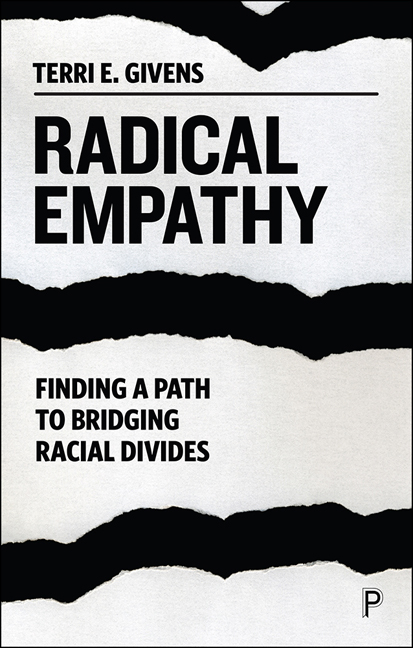Book contents
- Frontmatter
- Dedication
- Contents
- Note on the author
- Prologue:Writing in a time of crisis
- 1 Bridging divides: From racism to empathy in the 21st century
- 2 Getting to radical empathy
- 3 My family’s story: The isolation of internalized oppression
- 4 Racism and health disparities
- 5 Finding empathy in the academy
- 6 Love and marriage
- 7 Radical empathy in leadership: Creating change
- 8 Creating change at the national level: Restorative justice and working off the past
- 9 Revisiting the path to radical empathy
- Epilogue: The long road ahead
- Notes
- Suggested reading
- Index
2 - Getting to radical empathy
Published online by Cambridge University Press: 05 January 2022
- Frontmatter
- Dedication
- Contents
- Note on the author
- Prologue:Writing in a time of crisis
- 1 Bridging divides: From racism to empathy in the 21st century
- 2 Getting to radical empathy
- 3 My family’s story: The isolation of internalized oppression
- 4 Racism and health disparities
- 5 Finding empathy in the academy
- 6 Love and marriage
- 7 Radical empathy in leadership: Creating change
- 8 Creating change at the national level: Restorative justice and working off the past
- 9 Revisiting the path to radical empathy
- Epilogue: The long road ahead
- Notes
- Suggested reading
- Index
Summary
Change came rapidly in our world with the outbreak of the COVID-19 virus. Although the pandemic has laid bare the health and wealth inequities in our society, it has also led to communities coming together to help each other. I have been heartened by the people reaching out to offer support to the elderly and those lacking mobility in our neighborhood. I have family members who have been sewing masks to give away to those who need them, and people sharing their support for our healthcare providers who are on the front lines of the crisis. These actions are illustrative of the way that radical empathy can help us build community and create change.
As I write this, we are midway through the year 2020 and my family has managed to avoid the worst ravages of the COVID-19 pandemic, both in terms of health and wealth. It has not been an easy time, as we have all had to hunker down in our homes and do our own version of work, my two sons as students, my husband as an employee, and me, a writer. I have had several relatives who have gotten the virus, but luckily they have recovered, mostly unscathed.
The same cannot be said about our country and the world overall. Unemployment remains at near record highs, and states are struggling to find solutions that will balance the threats to the health of communities with the need to maintain economic activity. Our healthcare system is dealing with huge strains, as healthcare professionals succumb to the virus, but also in terms of the financial situation of many healthcare organizations as regular medical care is put on hold. It is not yet clear if and when a vaccine for the virus will be found.
What is remarkable is the fact that so many people are aware of the impact of the virus on Black and Brown communities. So many of my neighbors are showing how grateful they are for the first responders, people working in agriculture and food processing, and healthcare workers at all levels, as well as realizing that Black people in particular are more likely to die from the virus. It is clearly a time when empathy is playing a role in the way people are responding to the situation.
- Type
- Chapter
- Information
- Radical EmpathyFinding a Path to Bridging Racial Divides, pp. 23 - 38Publisher: Bristol University PressPrint publication year: 2021



